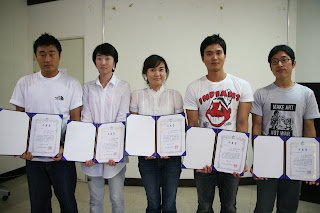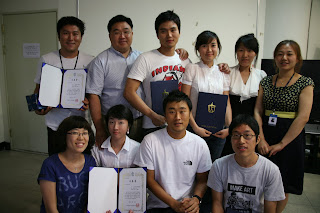I. November 27, 2008 -- MINBYUN-Lawyers for a Democratic Society


MINBYUN-Lawyers for a Democratic Society established on May 28, 1988. MINBYUN aims at the development of a systematic and organizational structure in response to human rights violations with the goal of becoming a valuable participant in the entire democratization movement. In addition, MINBYUN provides legal advice and cooperation to non-governmental organizations working for social progress. It consists of more than 500 lawyers from all parts of South Korea. The headquarters is located in Seoul, and there are seven other branch offices in Busan, Daegu, Ulsan, Gwangju-Jeonnam, Daejon-Chungcheong, Jeonju-Jeonbuk and Gyungnam.
I arrived at 1 PM and read some articles. At 2 PM I had meeting with Ms. Seo Seon-Young (an Attorney at Law) and Ms. Lee Chaeyoung (a Volunteer in MINBYUN as an Interpreter) questioned about generally situation of the court and law, the role of freedom assembly and demonstration, and around of candle demonstration in South Korea. Our meeting was around 2 hours. I got copies of articles and the Korean Law ‘ADA’ (Assembly and Demonstration Act).

II. November 28, 2008 -- PSPD (People’s Solidarity for Participatory Democracy)

It is a civil organization dedicated to promoting justice and human rights in Korean society through the participation of the people. PSPD founded in 1994 by more than 200 members. PSPD had been serving as a watchdog against the abuse of power, developed various activities to bring justice and democracy to many areas in the society.





I had meeting at around 10 AM with Ms. Cha Eunha (International Solidarity Committee). She explained about her organizations and gave a copy article related with the condition of freedom of assembly and democratization in South Korea.
She also asked me to write an article about my self and Indonesia and she will put it on her organization’s website. Our meeting finished at around 11.30 AM

III. November 29, 2008 -- Koh Jae Youl (A Reporter in SISA-IN)
I had meeting with Mr. Koh Jae Youl as a Staff Writer in SISA-IN Newspaper. SISA-IN is an independent newspaper in South Korea that established on September 2007.
I met him in Central City of Seoul at around 1 PM and finished at 4 PM. While he explained about his experiences as a reporter for around 9 years, we around the area where candle demonstrations were organize for the first time and nowadays. He explained about when, where, and why of candle demonstration. During my interview, there were 2 Korean students of Yonsei University who also interview him.



IV. December 2, 2008 -- Kim Sabong (A Professor of Philosophy Department in Chonnam University, Gwangju)
Professor Kim Sabong is a professor in Chonnam University of Philosophy Department. I met him at around 7 PM. He explained about the histories of democratic movements in South Korea. Our meeting was around 2 hours.

Unfortunately, organizations that I visited do not have books or other resources in English and also for their website.
I am thankful for the May 18 Memorial Foundation for the chance visited organizations in Seoul and Gwangju: meeting, interview with some people, and share histories, democratic movements, and law in South Korea. I learn and experienced lot of things.
By. Gregoria Barbarica K.R.
International Intern – The May 18 Memorial Foundation
International Intern – The May 18 Memorial Foundation
December 3, 2008
Link:

































































